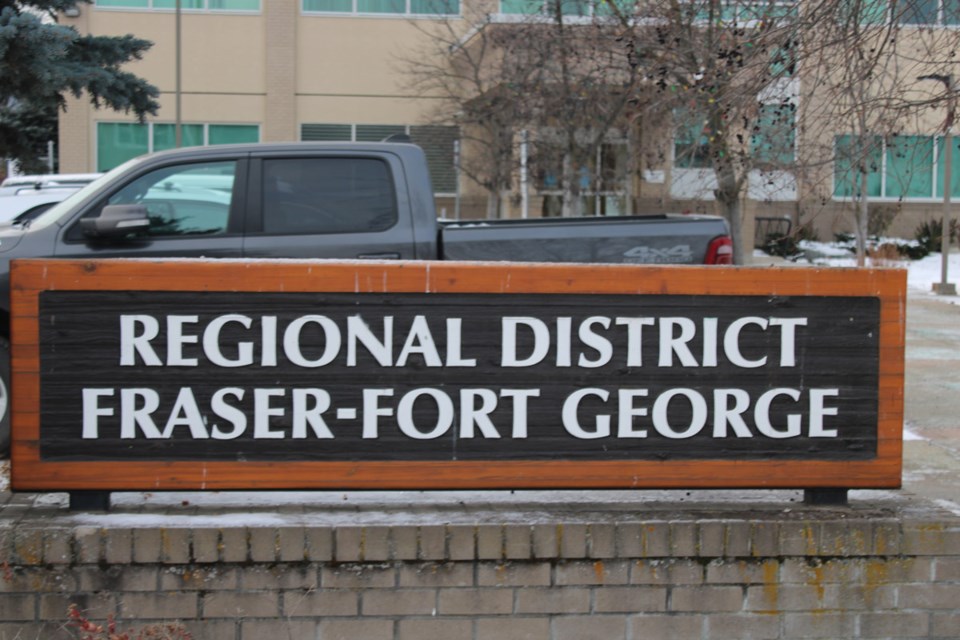Regional District of Fraser-Fort George directors voted 7-6 Thursday to reject a proposal to have votes in opposition to a motion be automatically recorded in the meeting minutes.
The outcome means directors will continue the practice of having their "no" votes recorded on an as-requested basis and followed on a lengthy discussion that hinged largely on the matters of transparency versus creating an unhealthy divisiveness.
Arguably, Mackenzie municipal director Joan Atkinson played the pivotal role. At the outset, Atkinson spoke in favour of the proposal.
"I think this supports transparency and so that the people who elected us will know how we voted on certain issues," Atkinson said.
But after hearing what fellow directors had to say, particularly McBride municipal director Gene Runtz, Atkinson changed her mind.
"Elected official have bullseyes on their backs these days unfortunately, that's the environment we find ourselves in," Atkinson said and went on to say regardless of how they voted on an issue, directors are obligated to support the result.
A long-time member of the Elks, Runtz said that votes by members of the service club were never recorded and contended the approach worked well.
"One of the things that I really liked about the Elks (was that) everybody was free to talk but once the decision, and that decision was always in the majority, that was the end of it," Runtz said. "And there is people around that want to single out individuals and go after them. That's unfortunate, but that's true and it's worse now than it's ever been and one way to stop that was saying it was the wish of the group."
Electoral Area C (Chilako River-Nechako) director Lara Beckett said having to keep track of who voted in opposition would make chairing board meetings more burdensome and worried it would make for a more adversarial tone.
"I see the regional district very much as a federation. We have rural areas, we have municipalities, we're working for the larger benefit of the region," Beckett said and went on to say that in terms of maintaining a working relationship among board members, she did not see a benefit from a routine recording of votes in opposition.
"If we defeat this recommendation and I will certainly be voting against, we would simply continue the current system of where we can have a request to have our vote recorded if we so choose and I would be in favour of continuing that practice," Beckett added.
Speaking in favour of the proposal, Prince George municipal director Simon Yu noted that as the city's mayor he routinely votes against council and noted council members' votes are recorded regardless. He said it helps voters know where council members stand on issues.
"In our form of democracy, we need to let the people judge us every which way they want," Yu said.
Not recording votes defeats the purpose of having open meetings, he added.
"I hear the concern, but I think the concern may not be there, just based on my own personal experience," he said of the worry about unwarranted blowback.
Conversely, Valemount director Owen Torgerson said it's the practice for that community's council to have votes in opposition recorded on a voluntary basis and noted rural directors are lone representatives for their areas.
"When you force the opposition vote to be recorded that can have a demoralizing impact on that electoral area (director) when potentially - never happens - media are seeking a story that isn't there," Torgerson said. "And you might be getting calls all day and all night to respond to a media request on why you voted no."
Prince George director Cori Ramsay suggested that on balance recording who voted yes or no on a particular issue will reverse an ongoing decline in the public's trust in government.
"I think a lot of times we do get pulled into that polarization because it is the rhetoric that the public and the news media like to produce to create stories," Ramsay said. "Regardless of that, I do think that that transparency around how we vote and around how we are accountable to that vote are really important to reinforcing the trust of the public. How can they trust us if they don't know what we're doing?"
Saying he was impressed by Ramsay's comments, Electoral Area D (Tabor Lake-Stone Creek) director Bill Empey spoke in favour of the proposal.
"I think people should know how we vote and be obligated to explain the reasons why they voted the way they did so I think the recording of the votes is important just for the basis of people wanting to know what goes on here," Empey said.
Speaking in favour, and filling in for Brian Skakun and Kyle Sampson, acting Prince George directors Ron Polillo and Trudy Klassen emphasized transparency.
"For the residents, regardless of whether you are in a regional district or in the city, I feel passionately that they need to know which way their representatives voted," Klassen said.
Speaking against the motion, Electoral Area E (Woodpecker-Hixon) director Art Kaehn said in his many years on the board he has voted one way on an issue and then another when the matter came up again a few months down the road.
"I want to be open-minded," Kaehn said.
Electoral Area A (Salmon River-Lakes) Victor Mobley said he agreed with the arguments in favour of transparency but also understands why on certain issues some directors may not want their vote recorded.
Danielle Alan (Electoral Area H Robson Valley-Canoe) and Jerrilyn Kirk (Electoral Area G Crooked River-Parsnip) joined Beckett, Atkinson, Torgerson and Kaehn in requesting to have their votes in opposition recorded.


